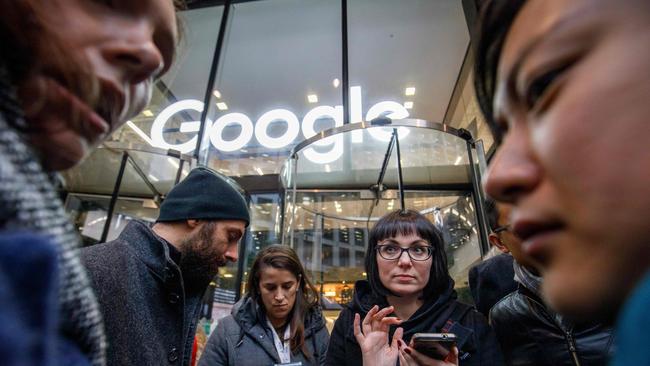Google union could rock tech giants

Established with the help of a campaign led by the Communication Workers of America, Google’s new union will be open to both employees and contractors, with members committing 1 per cent of their yearly wages towards union dues.
“This is historic — the first union at a major tech company by and for all tech workers,” Google software engineer Dylan Baker said in a statement.
“We will elect representatives, we will make decisions democratically, we will pay dues, and we will hire skilled organisers to ensure all workers at Google know they can work with us if they actually want to see their company reflect their values.”
So far only 227 workers out of more than 130,000 Alphabet workers are union members, but the move comes at a crucial juncture for the company, which has faced staff walkouts and a widespread backlash after it controversially fired one of its key AI executives, Dr Timnit Gebru.
A successful Google union could force its rivals – and their workers – to reassess their stances, and could inspire workers at those companies to collectively organise.
The tech giants have long been infamously anti-union. Tesla chief executive Elon Musk has been in a years-long battle over unionisation at his company’s 10,000 worker Fremont, California factory, with employees there unable to find enough signatures to unionise the plant. This is despite ongoing complaints about injuries and safety.

Amazon meanwhile has prevented unionism among its US ranks since it was founded in 1994, actively dissuading its employees from organising. The company reportedly this year posted job listings for intelligence analysts who would monitor “labour organising threats” and report findings to “internal stakeholders, up to and including executive leadership”. In April the company fired two tech workers who criticised the company’s warehouse workplace conditions.
Apple’s workers too are not unionised – though some of its shuttle drivers reportedly are – despite allegations it violated labour laws in its Chinese factories. A report from China Labor Watch last year found more than half of Apple’s workforce employed at its largest iPhone factory in Zhengzhou were temporary hires, including student interns. Apple said most of the claims were false.
Tech companies have generally been considered some of the best places to work, thanks to their generous compensation, employee perks including free food, and the world-changing nature of what they do. But there’s an insidious side, including a widespread culture of keeping employees at the office as long as possible, firing workers who are critical of company leadership, and more broadly keeping employees at bay, and from being allowed to organise.
Of course, Google’s new union will only be successful if its workers actually join, and see collective action as important.
Tech workers have generally been resistant themselves to such a move, given they perceive union agreements as restrictive and antithetic to the notion that they should be able to work wherever they want. It’s an individualistic mindset that might be okay for the programmers themselves, but in the long run damages the industry overall, including warehouse workers and those in tech who rely on the industry, but don’t necessarily have the ability to chase better conditions or pay at rival companies.
The power in “big tech” is slowly shifting towards its workers, but it’s up to them to take advantage of it.
There’s a lot on the line, and progress will be slow. While the Alphabet Workers Union won’t have collective bargaining rights, at least yet, the group has a stated goal of “building a structure to create worker power.” They’re essentially starting from scratch, given the pendulum of power has previously been weighted heavily towards tech executives, rather than their workers on the ground.
“Our union will work to ensure that workers know what they’re working on, and can do their work at a fair wage, without fear of abuse, retaliation or discrimination,” Google engineers Parul Koul and Chewy Shaw wrote in an oped this week.
The movement is growing. The Alphabet Workers Union said it is planning “informational events” to garner further internal support, while thousands of Amazon warehouse workers will vote in coming weeks on whether to form their first US-based union at the tech giant.
The hard work now begins for tech’s latest union, and its success could have wide-ranging implications for the entire tech industry, and 21st century society more broadly.



A move by more than 200 Google workers to form a union, the Alphabet Workers Union, is an overdue step that could send shockwaves around Silicon Valley, and force change at the world’s most powerful and valuable companies.